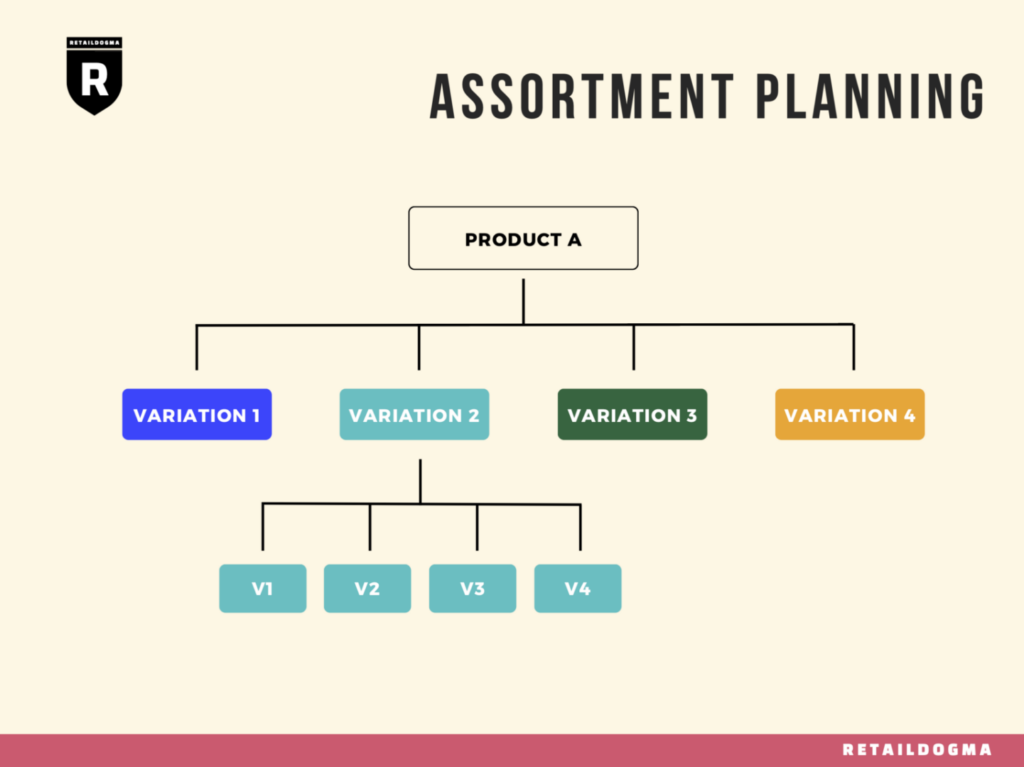What is Product Assortment?
Product assortment refers to the comprehensive range of products that a company offers to its customers. An effective assortment of products is vital for meeting diverse customer demands, accommodating different preferences, and ultimately driving sales. Businesses carefully curate their product variety based on market trends, consumer insights, and overall strategic objectives.
For instance, let’s consider a hypothetical mobile company named “eMob” that operates both physical retail stores and an online platform. Within its physical retail stores, the company offers an extensive array of mobile phones, strategically catering to diverse budgetary considerations and distinct customer preferences.
The product assortment covers a broad spectrum, ranging from entry-level devices to cutting-edge flagship smartphones that incorporate the latest technological advancements. Moreover, these brick-and-mortar stores showcase a diverse collection of phone accessories, including cases, screen protectors, chargers, and various other enhancements, all thoughtfully designed to elevate the overall customer experience.
Simultaneously, eMob’s online store mirrors the diverse set of products available in physical outlets on its digital shelf while offering exclusive online-only promotions and bundles to incentivize online shopping. This multi-channel approach enables them to reach a broader customer base and accommodate varying purchasing preferences. By utilizing both the retail and online channels, eMob maximizes its market reach, improves customer satisfaction, and boosts overall sales performance
Why Does it Matter?
The significance of this function in driving business success cannot be overstated. A thoughtfully curated product assortment not only enhances customer satisfaction but also positions businesses to maintain their competitiveness in the market, attracting new customers and optimizing sales opportunities.

Image Source: Retail Dogma
Let’s delve into the reasons why it matters and how it exerts its impact on various facets of a company’s operations and overall achievements.
Meeting Diverse Customer Needs:
A well-structured item assortment ensures that a company caters to a wide range of customer needs and preferences, offering diverse options to suit their requirements.
Enhancing Customer Satisfaction:
When customers can readily find products aligned with their specific desires within a company’s product range, it translates into heightened satisfaction levels and encourages repeat purchases. This fosters loyalty and customer retention.
Attracting New Customers:
Offering a comprehensive product range on the company’s digital shelf can attract fresh faces with different requirements and preferences, expanding the company’s reach to a broader audience.
Staying Competitive:
In a crowded market, having impressive product diversity sets a company apart from competitors and gives it a strong competitive advantage.
Maximizing Sales Opportunities:
More products mean more chances for upselling and cross-selling, which translates to higher transaction values and overall revenue. An analysis of current products can help determine what products work better to improve sales.
Responding to Market Trends:
A flexible product assortment allows a company to quickly adapt to changing market trends and customer demands, keeping them relevant in the industry.
Adapting to Seasonal Demands:
With a diverse product range, a company can easily adjust its offerings to meet seasonal demands and capitalize on periods of high sales.
The Impact on Sales
Enhancing sales and revenue is directly tied to effective product planning within a business. This involves curating a diverse range of products that align with customer preferences and market demands, enabling the business to cater to a broad customer base and capitalize on different market segments. Providing ample choices that meet specific customer needs increases the likelihood of making a purchase and drives overall sales growth.
Additionally, a strategically designed product assortment fosters higher customer satisfaction, leading to repeat purchases and long-lasting brand loyalty, which ensures both short-term revenue and long-term financial prosperity.
Moreover, businesses can remain adaptable and responsive to changing market trends and seasonal demands by staying attuned to customer preferences and industry shifts, allowing them to make timely adjustments to their product offerings and maintain relevance and competitiveness in the market.
Gaining a Competitive Edge with Product Assortment

Image Source: Shopify
Gaining a competitive edge in today’s dynamic market requires astute product planning. When businesses strategically curate their product offerings, they can differentiate themselves from their competitors and seize growth opportunities.
An intelligently designed product directory allows companies to cater precisely to their target customers’ diverse needs and preferences. By carefully analyzing market trends and customer insights, businesses can ensure their product lineup remains relevant and compelling, positioning themselves as a go-to choice for consumers.
Product diversity planning also empowers businesses to optimize their inventory management and operational efficiency. By maintaining the right mix of products, companies can minimize stockouts, reduce carrying costs, and improve overall supply chain effectiveness. This strategic approach not only enhances customer satisfaction by meeting demand consistently but also enables businesses to make data-driven decisions and allocate resources efficiently, thus fostering a competitive advantage in the market.
In addition to product diversity planning, businesses can also gain valuable insights and track their competitors’ strategies by leveraging digital shelf analytics.
By monitoring competitor products, pricing, and promotions online, companies can help them stay informed about market dynamics and consumer preferences. This equips businesses with a deeper understanding of their competitive landscape, enabling them to make informed decisions and adapt their product offerings to stay current.
Conclusion
Effective product assortment planning plays a crucial role in driving business success and gaining a competitive edge. By offering a diverse range of products that cater to customer needs and preferences, businesses can boost satisfaction, foster loyalty, and increase sales.
42Signals’ Digital Shelf Analytics can help businesses identify gaps in their offerings, discover emerging trends, and align their product mix with customer preferences, ultimately leading to increased customer satisfaction and higher sales. Contact us today- sales@42signals.com





